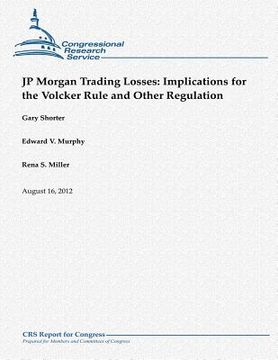Share
JP Morgan Trading Losses: Implications for the Volcker Rule and Other Regulation (in English)
Edward V. Murphy
(Author)
·
Rena S. Miller
(Author)
·
Gary Shorter
(Author)
·
Createspace Independent Publishing Platform
· Paperback
JP Morgan Trading Losses: Implications for the Volcker Rule and Other Regulation (in English) - Murphy, Edward V. ; Miller, Rena S. ; Shorter, Gary
$ 12.62
$ 15.99
You save: $ 3.37
Choose the list to add your product or create one New List
✓ Product added successfully to the Wishlist.
Go to My WishlistsIt will be shipped from our warehouse between
Wednesday, May 29 and
Thursday, May 30.
You will receive it anywhere in United States between 1 and 3 business days after shipment.
Synopsis "JP Morgan Trading Losses: Implications for the Volcker Rule and Other Regulation (in English)"
On May 10, 2012, JP Morgan disclosed that it had lost more than $2 billion by trading financial derivatives. Jamie Dimon, CEO and chairman of JP Morgan, reported that the bank's Chief Investment Office (CIO) executed the trades to hedge the firm's overall credit exposure as part of the bank's asset liability management program (ALM). The CIO operated within the depository subsidiary of JP Morgan, although its offices were in London. The funding for the trades came from what JP Morgan characterized as excess deposits, which are the difference between deposits held by the bank and its commercial loans. The trading losses resulted from an attempt to unwind a previous hedge investment, although the precise details remain unconfirmed. The losses occurred in part because the CIO chose to place a new counter-hedge position, rather than simply unwind the original position. In 2007 and 2008, JP Morgan had bought an index tied to credit default swaps on a broad index of high-grade corporate bonds. In general, this index would tend to protect JP Morgan if general economic conditions worsened (or systemic risk increased) because the perceived health of highgrade firms would tend to deteriorate with the economy. In 2011, the CIO decided to change the firm's position by implementing a new counter trade. Because this new trade was not identical to the earlier trades, it introduced basis risk and market risk, among other potential problems. It is this second "hedge on a hedge" that is responsible for the losses in 2012. Several financial regulators are responsible for overseeing elements of the JP Morgan trading losses. The Office of the Comptroller of the Currency (OCC) is the primary prudential regulator of federally chartered depository banks and their ALM activities, including the CIO of JP Morgan, even though it is located in London. The Federal Reserve is the prudential regulator of JP Morgan's holding company, although it would tend to defer to the primary prudential regulators of the firm's subsidiaries for significant regulation of those entities. The Federal Reserve also regulates systemic risk aspects of large financial firms such as JP Morgan. The CIO must comply with Federal Deposit Insurance Corporation (FDIC) regulations because it is part of the insured depository. The Securities and Exchange Commission (SEC) oversees JP Morgan's required disclosures to the firm's stockholders regarding material risks and losses such as the trades. The Commodity Futures Trading Commission (CFTC) regulates trading in swaps and financial derivatives. The heads of these agencies coordinate through the Financial Stability Oversight Council (FSOC), which is chaired by the Secretary of Treasury. The trading losses may have implications for a number of financial regulatory issues. For example, should the exemption to the Volcker Rule for hedging be interpreted broadly enough to encompass general portfolio hedges like the JP Morgan trades, or should hedging be limited to more specific risks? Are current regulations of large financial firms the appropriate balance to address perceptions that some firms are too-big-to-fail? The trading losses raise concerns about the calculation and reporting of risk by large financial firms. JP Morgan changed its value at risk (VaR) model during the time of the trading losses. Some are concerned that VaR models may not adequately address potential risks. Some are concerned that the change in reporting of the VaR at JP Morgan's CIO may not have provided adequate disclosures of the potential risks that JP Morgan faced. Such disclosures are governed by securities laws.

